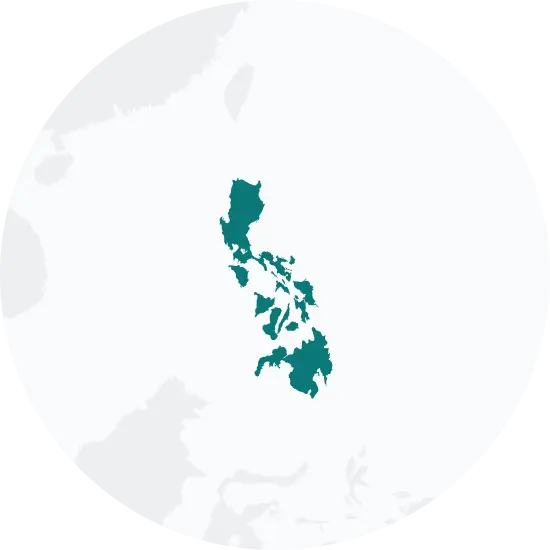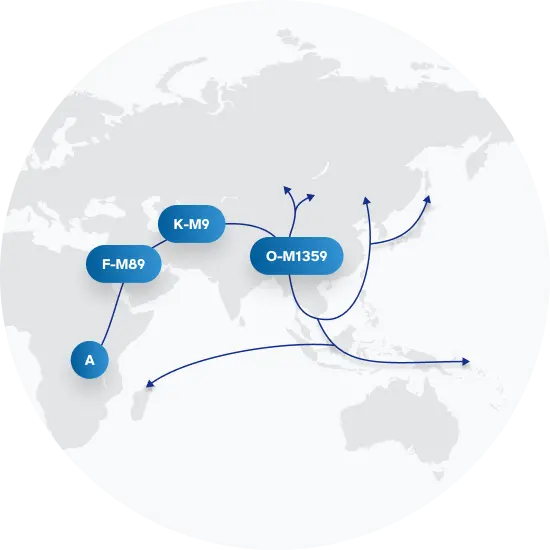Explore the Family Name Dizon
How common is the last name Dizon in the United States?
According to the Decennial U.S. Census data on popularity, the surname Dizon has been growing in prevalence in the United States. In 2000, Dizon ranked 7,012th on the list of most common surnames, but by 2010 it had risen in rank to 5,837th, marking a change of 16.76 percent. The actual count of people with the Dizon surname also increased significantly during this period, going from 4,409 in 2000 to 5,924 in 2010, an increase of 34.36 percent. This meant that for every 100,000 people in the U.S., the proportion of individuals named Dizon rose by 23.31 percent.
| 2000 | 2010 | Change | |
|---|---|---|---|
| Rank | #7,012 | #5,837 | 16.76% |
| Count | 4,409 | 5,924 | 34.36% |
| Proportion per 100k | 1.63 | 2.01 | 23.31% |
Race and Ethnicity of people with the last name Dizon
On the topic of ethnic identity, the Decennial U.S. Census data reveals that the majority of individuals with the Dizon surname identify as Asian/Pacific Islander. In 2000, this group constituted 84.37 percent of all Dizons, and the percentage slightly increased to 85.99 in 2010. During the same decade, the proportion of Dizons who identified as White decreased by 26.64 percent, while those identifying as Hispanic saw a modest increase of 15.09 percent. The figures for those identifying with two or more races remained relatively stable, whereas previously nonexistent percentages for those identifying as Black and American Indian and Alaskan Native were recorded in 2010.
| 2000 | 2010 | Change | |
|---|---|---|---|
| Asian/Pacific Islander | 84.37% | 85.99% | 1.92% |
| Two or More Races | 5.35% | 5.25% | -1.87% |
| White | 6.08% | 4.46% | -26.64% |
| Hispanic | 3.18% | 3.66% | 15.09% |
| Black | 0% | 0.52% | 0% |
| American Indian and Alaskan Native | 0% | 0.12% | 0% |
Dizon ancestry composition
23andMe computes an ancestry breakdown for each customer. People may have ancestry from just one population or they may have ancestry from several populations. The most commonly-observed ancestry found in people with the surname Dizon is Filipino & Austronesian, which comprises 62.1% of all ancestry found in people with the surname. The next two most common ancestries are British & Irish (10.7%) and Chinese (7.9%). Additional ancestries include French & German, Spanish & Portuguese, Japanese, Ashkenazi Jewish, and Eastern European.
Ready to learn more about your ancestry? Get the most comprehensive ancestry breakdown on the market by taking our DNA test. Shop 23andMe
| ANCESTRY BREAKDOWN | COMPOSITION |
|---|---|
| Filipino & Austronesian | 62.1% |
| British & Irish | 10.7% |
| Chinese | 7.9% |
| Other | 19.4% |

Possible origins of the surname Dizon
Your DNA provides clues about where your recent ancestors may have lived. Having many distant relatives in the same location suggests that you may all share common ancestry there. Locations with many distant relatives can also be places where people have migrated recently, such as large cities. If a large number of individuals who share your surname have distant relatives in a specific area, it could indicate a connection between your surname and that location, stemming from either recent ancestral ties or migration.
Based on 23andMe data, people with last name Dizon have recent ancestry locations in the Philippines and China.
| RECENT ANCESTRY Location | Percentage |
|---|---|
| Bicol, Philippines | 82.60% |
| Calabarzon, Philippines | 82.60% |
| Central Luzon, Philippines | 82.60% |
| Western Visayas, Philippines | 82.60% |
| Metro Manila, Philippines | 82.60% |
What Dizon haplogroups can tell you
Haplogroups are genetic population groups that share a common ancestor on either your paternal or maternal line. These paternal and maternal haplogroups shed light on your genetic ancestry and help tell the story of your family.
The top paternal haplogroup of people with the surname Dizon is O-F81, which is predominantly found among people with East Asian & Indigenous American ancestry. Haplogroup O-F81 is descended from haplogroup O-M1359. Other common haplogroups include O-F706 and N-L665, which are predominantly found among people with East Asian & Indigenous American and East Asian & Indigenous American ancestry. Other surnames with similar common haplogroups are: Shen, Ta, Yu, Chu, De Guzman, Fan, Chang, Chew, Wang, Cheng.
The most common maternal haplogroups of people with Dizon surname are: B4b1a2, B4a1a, E1a1a. These most commonly trace back to individuals of East Asian & Indigenous American ancestry.
 Paternal Haplogroup Origins O-M1359
Paternal Haplogroup Origins O-M1359
Your paternal lineage may be linked to the Han Chinese
Haplogroup O1a is a branch of O-M119, also called O1a. O-M119 and its branches are present in both northern and southern Han Chinese men at low to moderate frequencies, but are most common among the Jiangsu, Shanghai, and Zhejiang southern Han groups. The Han people, who all share the same language and similar cultural practices, are the largest ethnic group in the world, with about 1.2 billion people. Historical evidence shows that Han people are descendants of the ancient Huaxia tribes that come from northern China, and Han language and culture only expanded into southern China in the last 2,000 years. The spread of Han people and culture from northern to southern China was likely driven by warfare and famine in the north. Members of O-M119 belong to a group that has helped to shape the culture of the world's largest ethnic group.
Your maternal lineage may be linked to the Han
Members of haplogroups B4 and B5 are quite frequent in both northern and southern Han Chinese populations. The Han people, who all share the same language and similar cultural practices, are the largest ethnic group in the world, with about 1.2 billion people. Historical evidence shows that Han people are descendants of the ancient Huaxia tribes that come from northern China, centered in Zhongyuan, China's Central Plain. The spread of Han people, language and culture from northern to southern China only occurred in the last 2,000 years, and was likely driven by warfare and famine in the north.

What do people with the surname Dizon have in common?
Spoiler alert: it's complicated. People with the same last name are usually no more genetically similar than a randomly sampled group of people from the same population. That said, people with the same surname are more likely to have similar ancestries than randomly sampled individuals. The reason is the tendency of people with similar cultural or geographical backgrounds to preferentially mate with one another. That's why people who share a surname may be more likely to share traits and tendencies in common than people within the general population. Check out the percentages below to see the prevalences of tastes, habits, and traits of people with your surname compared with prevalences among 23andMe users.
Preferences
Traits
Wellness

Migraine
A severe headache characterized by intense pain, sensitivity to light and sound, and often accompanied by nausea and vomiting.
"Dizon" Surname 11.1%
23andMe Users 16.4%
Are health conditions linked to the last name Dizon?
The short answer is that, if there is an association between surname and health, it's usually more about your ancestry than your name. Individuals with a given surname are no more genetically similar than the general population but often have similar ancestries. The populations of people associated with those shared ancestries often have sets of genetic variations, also known as alleles, in common. Some of those alleles are associated with a greater likelihood of developing certain diseases.
Disease variant frequency by ancestry
Disease allele frequencies in populations associated with the surname Dizon are shown below. Important Note: not everyone with a disease allele will develop these health condition




